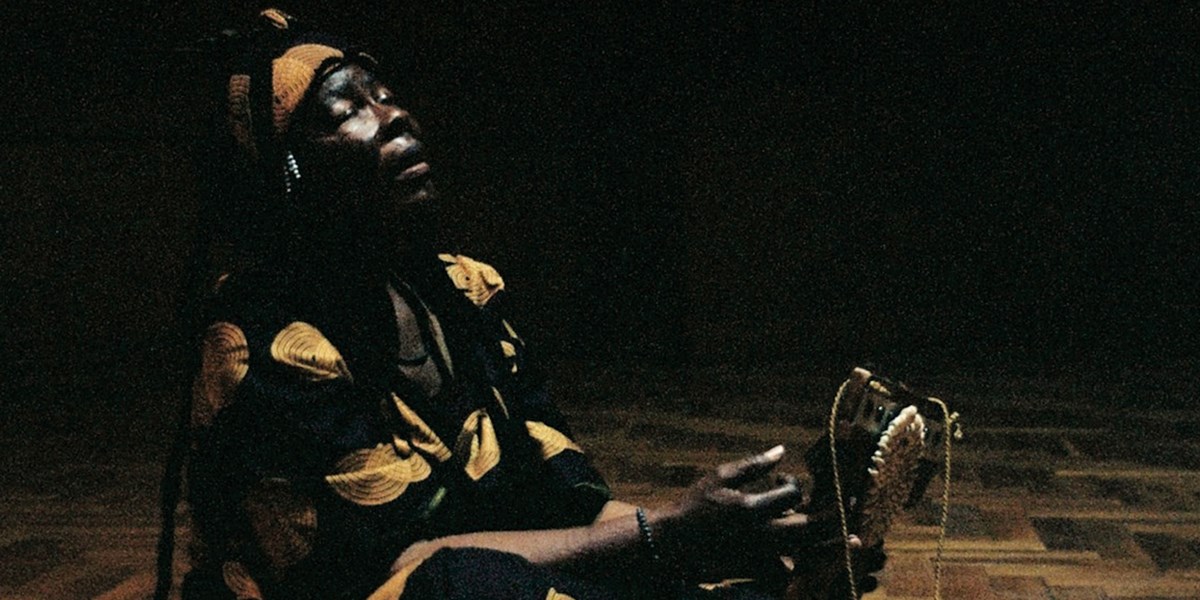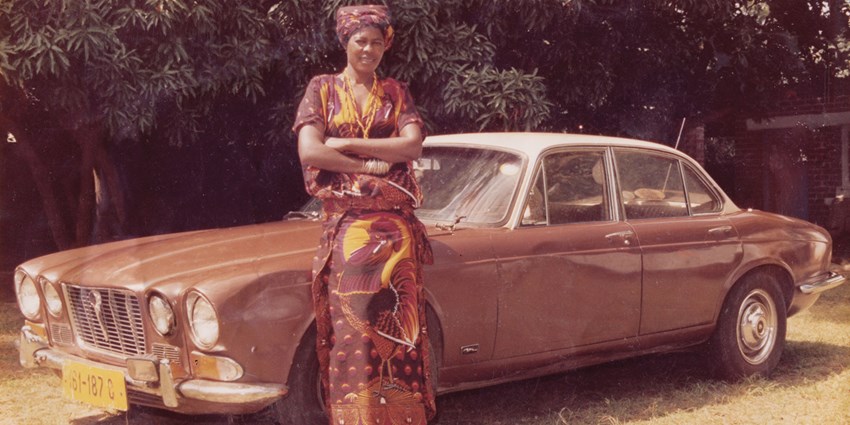Thursday, April 22, 2021
Stella Chiweshe: “I ignored men, I ignored women, I ignored the government, I ignored the church, because I wanted to survive. That’s how I started to play”
By Jim Hickson
For over five decades Stella Chiweshe has been on a mission to promote the mbira and Zimbabwe’s Shona culture. She tells Jim Hickson about her calling

Stella Chiweshe [photo: Camille Bokhobza]
Stella Chiweshe is 74 years old. She’s travelled the world, starred in films, been a cultural ambassador for Zimbabwe, and much more besides. She defied social taboo and colonial laws to become one of the first female professional mbira players and she follows the voices of spirits. She has a lot of stories to tell.
A typically magical story is the first time she performed with European musicians – members of 3 Mustaphas 3 – while recording in Berlin. The Mustaphas were understandably nervous ahead of their first encounter with Chiweshe. But Chiweshe wasn’t worried. She’d met them before. “Yes, it was my first time meeting them physically,” she grins, “but in my sleep, when I was dreaming, I had played with them for a long time before. When we finally met, it was like flipping a switch. They got the music right in a very short time. They were all so surprised, but I was just laughing!”

Those recordings became the album Ambuya?, released on Piranha Records in 1987. Now, 33 years later, Piranha have reissued the album as a shiny new remaster, giving Chiweshe – and us – a great opportunity to look back on her legacy, and to explore ways to make sure it lives on. Ambuya? marked firsts on many fronts – her first album, first international release, the first time recording her signature sound of mbira and two marimbas – but the story of spiritual guidance helping her on the way to becoming the Queen of Mbira is one that occurs again and again throughout her life. To even make it to the Berlin studio was a triumph.
The mbira is a powerful instrument. It is a symbol of the Shona people and an important part of their traditional worship. When played, especially during bira ceremonies, it conjures spirits of the ancestors for possession, intercession and protection. When Chiweshe was first called to the mbira, Zimbabwe was still Rhodesia, and neither the racist settler-colonialist government nor the Christian church would allow such dangerous tools in the hands of the people. The mbira, along with all traditional elements of Shona culture, was banned.
![Stella Chiweshe [photo: Maria Svidryk]](/media/4690/stellachiweshe-bymariasvidryk-2.jpg?width=850&upscale=false)
Stella Chiweshe [photo: Maria Svidryk]
“But if it is something that is in the blood and the veins of the people, it is not possible to completely remove it,” Chiweshe explains while the twinkle in her eye is almost audible. “We did not stop playing mbira in the communal lands, we didn’t!”
Instruments were transported under the cover of darkness and bira were held way out in the countryside, away from the ears of police and clergy. Amid this secretive resistance of cultural continuation, though, Chiweshe still faced additional barriers. The mbira was a man’s domain; the idea of a woman playing the instrument was scandalous.
But Stella Rambisai Chiweshe has always been strong-willed – and she was chosen. The spirit of her sixth-great-grandfather put the mbira in her mind and an ache in her soul. Mbira was all she could think about for two years until she made it her mission to learn when she was 16 years old. It wasn’t easy. Every teacher refused her. When she asked her grandfather why no one would teach a girl, he told her that no man would want a wife that played mbira. “And you know how I took it? It made me laugh! ‘Really? Is that all?!’ I couldn’t believe it!” To her surprise, her grandfather directed her to her great-uncle. This was her last hope.
“When I got there, it took me three days to ask. I saw him come out, sit down and start to play. I walked towards him as if I was walking on eggs! I went up to him and said, ‘excuse me, can you please show me how to play?’ He looked at me, and his eyes went into my chest where I had pain for two years. His eyes touched my pain. He said ‘sit down, I will teach you how to play,’ and even before I sat down, the pain just vanished. I’d heard a voice talking into my ear, telling me that the remedy was to play mbira. It gave me courage to ignore everyone. I ignored men, I ignored women, I ignored the government, I ignored the church, because I wanted to survive. That’s how I started to play.”
With the mbira in her hands, Chiweshe not only survived, she thrived. After three years of study, she began to play at the forbidden bira ceremonies with the threat of imprisonment if caught. She also performed in secular contexts, forming her own band and recording 20 singles. In 1981, she became a member of the newly independent Zimbabwe’s National Dance Company, where her skills as an mbira player were celebrated on the world stage rather than hidden out of sight; she even played the titular role in the film Ambuya Nehanda, a medium, martyr and Zimbabwean hero known as Mbuya Nehanda. After moving to Germany in the 1980s, her international career blossomed. She’s released many albums, recorded two Peel Sessions and toured the world, including playing solo mbira to more than 10,000 people at WOMAD USA in 1994.
And through all of this success, she has been guided by the voices of her ancestors. The spirits are incredibly significant to Chiweshe. They advise her, inhabit her dreams, give her visions, bring new songs to her fingers and voice and, yes, introduce her to future band members. Once she moved to Germany, she brought the ancestors with her: “Ancestors are spirits, and this is my culture; my culture is in me and my spirits are in me! They are not living people who I have left behind in Zimbabwe. It is a spiritual world, it is everywhere.”
As much as Chiweshe’s music delights her fans, it becomes clear when she speaks that, for her, it is the spirituality of the music that remains of the utmost importance. When she plays her hypnotic, circular patterns, it is to entertain the ancestral spirits as well as to allow these spirits to communicate with her audience. Sometimes, the spirits take charge, altering her mind to create amazing things. “Once I was playing and I started to see the mbira as the head of a lion, the keys were the teeth of the lion. There was no way to escape, so the only thing I could do was to break the teeth of the lion. It happened for a long time that I was fighting with the lion, breaking its teeth. Afterwards, people were looking at me and I was wondering what was happening when I was breaking the teeth!”
The ancestors tether Chiweshe’s work to her roots, and provide a common thread throughout her life: chivanhu, Shona tradition. Whether carrying the ancient traditions in her soul, radically updating and reinventing them on record and on stage or showcasing them abroad, the concept of chivanhu has always been at the core. That’s why Chiweshe’s largest and on-going project is the Chivanhu Centre near Harare.
The centre is Chiweshe’s way of continuing her commitment to Zimbabwe’s traditions and culture while she’s in Germany, and for long after she joins the pantheon of ancestors herself. Laid out like a village among the mountains north of Harare, the centre will be a place for learning and living the tradition. It will function as both a school and a community; people can come to learn to play mbira or hosho (rattles), or learn to sing or dance – they can even learn how to make traditional beer, a vital component in bira ceremonies. And it’s open for everybody. “All the experience that I get through my travels with music, I would like to share it with the youth, with schoolchildren and with older people, to give back what I have experienced in my lifetime.”
![Stella Chiweshe [photo: Margaret Waller]](/media/4689/stellachiweshe-bymargarebwaller.jpg?width=850&upscale=false)
Stella Chiweshe [photo: Margaret Waller]
Just as Chiweshe used her music to resist colonial rule as a teenager, the Chivanhu Centre will carry on that fight. Shona culture has never fully recovered from those evils. “You know that since we were colonised for 100 years, for all that time our traditional music was oppressed,” she says. “People were not free to sing their traditional songs. Now, this place is somewhere that will help people to bring out what they have.” Rebellion is a lifestyle and Chiweshe knows that celebrating chivanhu as a community is radical. It’s a big vision, but work is already underway. There are plans to build a borehole, a solar power system, a community hall, a specialised music room, several huts and a garden. Although a crowdfunding campaign gathered only 40% of its target at the end of 2020, the project continues undeterred. The Chivanhu Centre will be a beautiful castle and a testament to the life and work of Chiweshe and the Shona people.
When her first album was released in 1987, it was given the title Ambuya?. Ambuya is the Shona word for ‘grandmother,’ and is used as a title of respect for female elders. That original title represented a call to the ancestors, to the powerful women of the Shona people. With its 2021 reissue, the title has changed – it is now Ambuya!. No more questions necessary. A studious caretaker of Shona heritage with over 50 years of mastery and innovation on the mbira, Ambuya Stella Chiweshe is the bearer of a great legacy. With the work of the Chivanhu Centre, it’s a legacy that will continue for a long time.
This article originally appeared in the April 2021 issue of Songlines. Never miss an issue – subscribe today!

